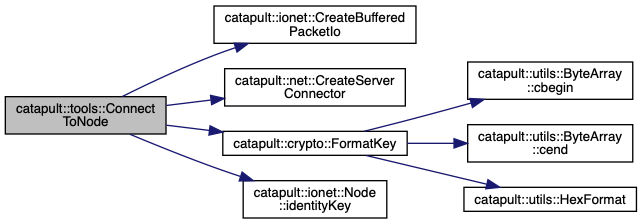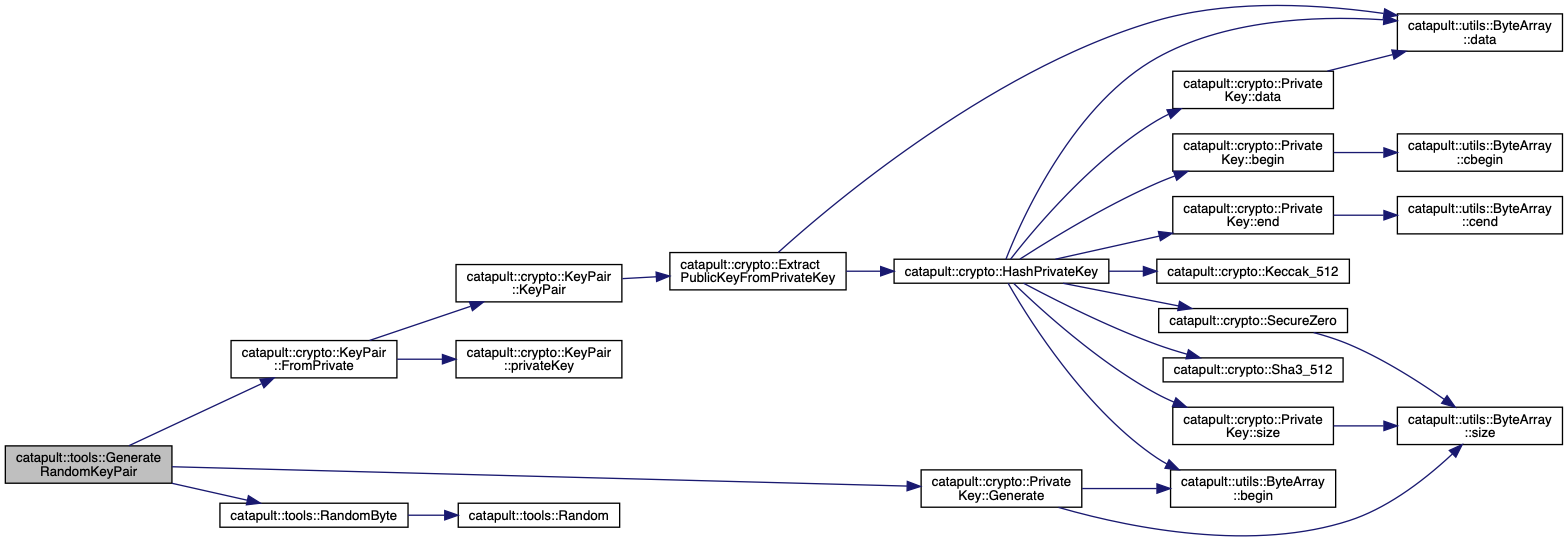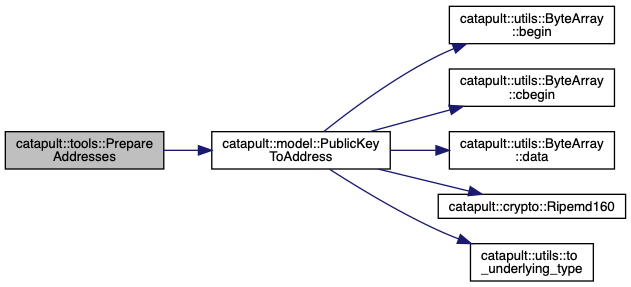Namespaces | |
| address | |
| benchmark | |
| health | |
| nemgen | |
| network | |
| statusgen | |
Classes | |
| class | CommandParser |
| Interface for command line parsing. More... | |
| class | KeyValueOutputBuilder |
| class | MultiNodeConnector |
| Helper class for connecting to multiple nodes. More... | |
| class | NetworkCensusTool |
| A base class for a tool that performs a network census by communicating with all nodes. More... | |
| class | RandomGenerator |
| Random generator. More... | |
| class | Tool |
| Interface for the tools. More... | |
Typedefs | |
| using | OptionsBuilder = boost::program_options::options_description_easy_init |
| Options builder. More... | |
| using | OptionsPositional = boost::program_options::positional_options_description |
| Definition of positional arguments. More... | |
| using | Options = boost::program_options::variables_map |
| Provides access to parsed options. More... | |
| using | PacketIoFuture = thread::future< std::shared_ptr< ionet::PacketIo > > |
| Future that returns a packet io shared pointer. More... | |
Functions | |
| template<typename TValue > | |
| std::string | Join (const std::vector< TValue > &values, const std::string &separator) |
| Joins all values with separator. More... | |
| template<typename TValue > | |
| auto | OptionsValue () |
| Helper wrapper to simplify defining values with no specified storage. More... | |
| template<typename TValue > | |
| auto | OptionsValue (TValue &value) |
| Helper wrapper to simplify defining values where value is used as storage. More... | |
| auto | OptionsSwitch () |
| Helper wrapper to simplify defining toggle values. More... | |
| uint64_t | Random () |
| Generates a uint64_t random number. More... | |
| uint8_t | RandomByte () |
| Generates a uint8_t random number. More... | |
| config::CatapultConfiguration | LoadConfiguration (const std::string &resourcesPath) |
| Loads the configuration from resourcesPath. More... | |
| std::vector< ionet::Node > | LoadOptionalApiPeers (const std::string &resourcesPath, model::NetworkIdentifier networkIdentifier) |
| Loads optional api peers configuration from resourcesPath for network networkIdentifier. More... | |
| std::vector< ionet::Node > | LoadPeers (const std::string &resourcesPath, model::NetworkIdentifier networkIdentifier) |
| Loads p2p peers configuration from resourcesPath for network networkIdentifier. More... | |
| crypto::KeyPair | LoadServerKeyPair () |
| Returns server key pair used by tools. More... | |
| crypto::KeyPair | GenerateRandomKeyPair () |
| Returns random key pair. More... | |
| std::vector< Address > | PrepareAddresses (size_t count) |
| Generate count deterministic addresses. More... | |
| int | ToolMain (int argc, const char **argv, Tool &tool) |
| PacketIoFuture | ConnectToLocalNode (const crypto::KeyPair &clientKeyPair, const Key &serverPublicKey, const std::shared_ptr< thread::IoThreadPool > &pPool) |
| PacketIoFuture | ConnectToNode (const crypto::KeyPair &clientKeyPair, const ionet::Node &node, const std::shared_ptr< thread::IoThreadPool > &pPool) |
| Connects to node as a client with clientKeyPair using pPool. More... | |
| std::shared_ptr< thread::IoThreadPool > | CreateStartedThreadPool (uint32_t numThreads=1) |
| Creates a started thread pool with numThreads threads. More... | |
| template<typename TAction , typename TFuture > | |
| bool | UnwrapFutureAndSuppressErrors (const char *description, TFuture &&future, TAction action) |
Typedef Documentation
◆ Options
| using catapult::tools::Options = typedef boost::program_options::variables_map |
Provides access to parsed options.
◆ OptionsBuilder
| using catapult::tools::OptionsBuilder = typedef boost::program_options::options_description_easy_init |
Options builder.
◆ OptionsPositional
| using catapult::tools::OptionsPositional = typedef boost::program_options::positional_options_description |
Definition of positional arguments.
◆ PacketIoFuture
| using catapult::tools::PacketIoFuture = typedef thread::future<std::shared_ptr<ionet::PacketIo> > |
Future that returns a packet io shared pointer.
Function Documentation
◆ ConnectToLocalNode()
| PacketIoFuture catapult::tools::ConnectToLocalNode | ( | const crypto::KeyPair & | clientKeyPair, |
| const Key & | serverPublicKey, | ||
| const std::shared_ptr< thread::IoThreadPool > & | pPool | ||
| ) |
Connects to localhost as a client with clientKeyPair using pPool. Localhost is expected to have identity serverPublicKey.

◆ ConnectToNode()
| PacketIoFuture catapult::tools::ConnectToNode | ( | const crypto::KeyPair & | clientKeyPair, |
| const ionet::Node & | node, | ||
| const std::shared_ptr< thread::IoThreadPool > & | pPool | ||
| ) |
Connects to node as a client with clientKeyPair using pPool.


◆ CreateStartedThreadPool()
| std::shared_ptr< thread::IoThreadPool > catapult::tools::CreateStartedThreadPool | ( | uint32_t | numThreads | ) |
Creates a started thread pool with numThreads threads.

◆ GenerateRandomKeyPair()
| crypto::KeyPair catapult::tools::GenerateRandomKeyPair | ( | ) |
Returns random key pair.

◆ Join()
| std::string catapult::tools::Join | ( | const std::vector< TValue > & | values, |
| const std::string & | separator | ||
| ) |
Joins all values with separator.

◆ LoadConfiguration()
| config::CatapultConfiguration catapult::tools::LoadConfiguration | ( | const std::string & | resourcesPathStr | ) |
Loads the configuration from resourcesPath.


◆ LoadOptionalApiPeers()
| std::vector< ionet::Node > catapult::tools::LoadOptionalApiPeers | ( | const std::string & | resourcesPath, |
| model::NetworkIdentifier | networkIdentifier | ||
| ) |
Loads optional api peers configuration from resourcesPath for network networkIdentifier.


◆ LoadPeers()
| std::vector< ionet::Node > catapult::tools::LoadPeers | ( | const std::string & | resourcesPath, |
| model::NetworkIdentifier | networkIdentifier | ||
| ) |
Loads p2p peers configuration from resourcesPath for network networkIdentifier.


◆ LoadServerKeyPair()
| crypto::KeyPair catapult::tools::LoadServerKeyPair | ( | ) |
Returns server key pair used by tools.

◆ OptionsSwitch()
|
inline |
Helper wrapper to simplify defining toggle values.
◆ OptionsValue() [1/2]
| auto catapult::tools::OptionsValue | ( | ) |
Helper wrapper to simplify defining values with no specified storage.
◆ OptionsValue() [2/2]
| auto catapult::tools::OptionsValue | ( | TValue & | value | ) |
Helper wrapper to simplify defining values where value is used as storage.
◆ PrepareAddresses()
| std::vector< Address > catapult::tools::PrepareAddresses | ( | size_t | count | ) |
Generate count deterministic addresses.

◆ Random()
| uint64_t catapult::tools::Random | ( | ) |
Generates a uint64_t random number.

◆ RandomByte()
| uint8_t catapult::tools::RandomByte | ( | ) |
Generates a uint8_t random number.


◆ ToolMain()
| int catapult::tools::ToolMain | ( | int | argc, |
| const char ** | argv, | ||
| Tool & | tool | ||
| ) |
Bootstraps and executes the tool. argc and argv are arguments passed to main.


◆ UnwrapFutureAndSuppressErrors()
| bool catapult::tools::UnwrapFutureAndSuppressErrors | ( | const char * | description, |
| TFuture && | future, | ||
| TAction | action | ||
| ) |
Gets the value associated with future and forwards it to action on success. On failure, false is returned and description is included in a warning log.

